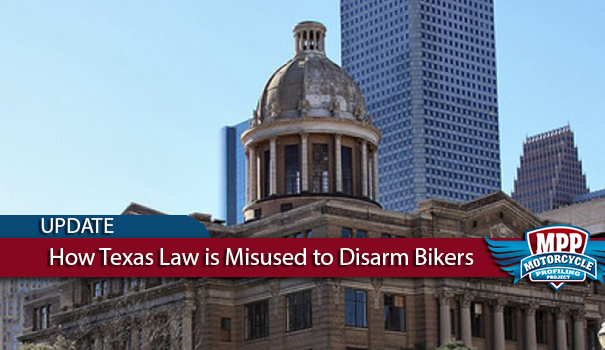If this seems outrageous, your instincts are correct. The MPP, after conducting cursory research on 46.02, has identified precedent, Ex Parte Flores 483 SW 3d 632 (2015), that clearly articulates how law enforcement is currently misinterpreting and misapplying Texas statute in violation of the basic rules of evidence and the US Constitutional.
Law Enforcement and prosecutors should immediately cease and desist misapplying Texas statute. Applying Texas Penal Code 46.02 to members of clubs with no criminal records, and even LTC’s, would chill 1st Amendment Association and the doctrine of personal guilt, “a cornerstone of American Jurisprudence.”
Summary of Ex Parte Flores
Ex Parte Flores, decided by the Texas 14th Court of Appeals in November, 2015, completely discredits law enforcement’s current application of 46.02 to any member of a club labeled a criminal street gang by law enforcement, found to be in possession of a weapon.
The plain language of 46.02 requires that the defendant must be one of the three or more individuals continuously or regularly associating in the commission of criminal activities. To apply 46.02 to any member of the Bandidos, for example, relies on an incorrect construction of the statute that would be constitutionally arbitrary and overbroad.
Law Enforcement and Prosecutors are Ignoring Caselaw
Law enforcement and prosecutor’s “arguments that a defendant need not be involved in or even aware of the gang’s criminal activities rely on [an] incorrect construction of the statute. The term “member” in section 46.02(a-1)(2)(C) derives its content from the definition of “criminal street gang” contained in section 71.01(d). Read together, these provisions indicate that a gang “member” must be one of the three or more persons who continuously or regularly associate in the commission of criminal activities.” (Ex Parte Flores at 16)
Ex Parte Flores explains that all evidence of criminal activity not directly connected to the defendant must be excluded under Rule 403. Moreover, 46.02 does NOT authorize law enforcement’s currently unfettered, arbitrary, and discriminatory application of 46.02 being applied to individuals for mere membership in what law enforcement labels a criminal street gang.
The task to identify whether an individual continuously or regularly associates in the commission of criminal activity is well within normal law enforcement duties during a traffic stop. No indication of a criminal record, no outstanding warrants, or the possession of a LTC are clear indications that an individual is not continuously or regularly associating in the commission of criminal activity.
Finally, applying 46.02 solely based on membership in a motorcycle club violates the 1st Amendment and the doctrine of personal guilt. There is “no evidence that by merely wearing [1%] “colors,” an individual is “involved in or associated with the alleged violent or criminal activity of other [1%] members. It is a fundamental principle that the government may not impose restrictions on an individual “merely because an individual belong[s] to a group, some members of which committed acts of violence.” In fact, the Supreme Court has long “disapproved governmental action . . . denying rights and privileges solely because of a citizen’s association with an unpopular organization.” Healy v. James, 408 U.S. 169, 185-86 (1972).
To permit law enforcement to arrest, and prosecutors to charge, any person “who wears the insignia of the [1% club], without regard to or knowledge of that individual’s specific intent to engage in the alleged violent activities committed by other members, is antithetical to the basic principles enshrined in the First Amendment and repugnant to the fundamental doctrine of personal guilt that is a hallmark of American jurisprudence. See Coles v. Carlini 162 F.Supp.3d 380 (2015)
Why Did a Jury Say it’s Illegal For a Bandido to Posses a Gun?
The recent conviction of Bandido DT in El Paso was unjust and raises some serious questions. The requirement of personal guilt should have been explained to the jury. Why would every attorney involved not be aware of Ex Parte Flores? Why would evidence of crimes not directly connected to DT be entered into evidence considering Rule 403 is a basic rule of evidence?
The MPP has every hope that DT will be successful on appeal and that this recent trend will come to an end. Or at the very least, that those continuing to falsely arrest and maliciously prosecute individuals based on a misinterpretation and application of statute will be held responsible.
Law Enforcement and Prosecutors Should Cease And Desist
All law enforcement agents, law enforcement agencies, and prosecutors should immediately cease and desist applying 46.02 to individuals solely based on membership in a motorcycle club that authorities label a criminal street gang. Probable cause for arrest under 46.02 requires that an individual not only express association, but also be directly involved in the continuous or ongoing criminal activity of the organization.
Absent other specific evidence, a clean criminal history check or a valid LTC are factors that can be established during a traffic stop that evaporate the probable cause necessary to establish that an individual is a member of a criminal street gang by statute, and hence subject to arrest and prosecution under Texas Penal Code Section 46.02 which prohibits possession of weapons by members of criminal street gangs.
There is simply no excuse for prosecutors in these jurisdictions. A basic understanding of the rules of evidence reveals that any criminal activity not directly connected to the defendant has no probative value, is unduly prejudicial, and should properly be excluded under Rule 403, specifically in 46.02 proceedings.
Arrests of motorcycle club members with no criminal records for illegal possession of weapons in El Paso, Ft. Worth, Houston and elsewhere in Texas, should NOT be happening. Proper training and understanding of Constitutional Principles and relevant case law would prevent such miscarriages of justice.
The post Authorities Misapplying Texas Law to Disarm Bikers appeared first on Motorcycle Profiling Project.




